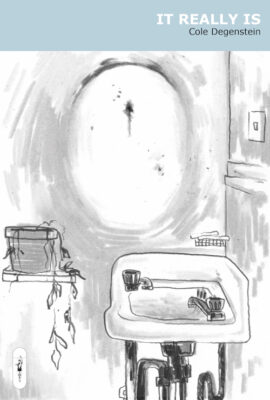In what was most probably 2018, I squeezed through the rows of fold-out tables at Expozine, getting dulled by the buzz of the church basement as it sizzled like an anthill. I brought home a single-sheet salmon-pink zine.

It Really Is
Cole Degenstein
Conundrum Press
$10.00
paper
96pp
9781772621037
The A4-size poster has been taped up in every room I’ve lived in since, and during that time I’ve watched Degenstein’s work move from sheets of printer paper to bound books, to skin (Degenstein also works as a tattooist), to his most recent publication, It Really Is.
It Really Is is an autofiction comic set somewhere between Montreal’s merciless winter and the protagonist’s merciless headspace. The text, like proclamations into the void, calls to mind the thoughts that spiral around one’s head when the sun starts setting mere hours into the day.
Degenstein’s distinct mark-making, his manner of moving from abstraction to realism, and his ability to communicate expansively with spare words, result in works that sit in their own realm of illustration, graphic novel, and poetry – stories that oscillate between tender depictions of intimacy, rural life, queerness, and domesticity.
The city transpires through the background, only by suggestion but remarkably distinct: the fruiteries, curbs full of trash, a dry leaf tumbling confusedly to the cold ground, a bike buried in snow. Seesawing between these snapshots of the city are images of death and decay: vegetables chewed by mould; a crow lying motionless, curved talons to the sky.
The prose is loose and measured, with words connecting at times like constellations, mapped out by waxy pencil lines. The phrases and images are intimate – as though you’re seeing through the writer’s eyes, as they lazily open and close to scenes of a neglected apartment where the dishes pile and fruit rots.
Fittingly, the book is printed in black and white, and in the sections that focus on the protagonist’s interiority, detail is swapped for reduced line drawings and hints of form – where the narrator tries “To forget my face and exist only as a body / to suss out the part of me that goes rotten when it gets cold out.”
The weight is interrupted by earnest moments of humour: the musings of cruel “city geese” and inanimate objects in the apartment whispering judgments of the tenant – “Remember how much you used to cook?” – and amid these dismal times, the narrator eventually finds their footing in the frozen season again. Alongside the trash, they begin to see the dirty windshield streaks as a rainbow, the covered-up Vespas as sculpture.
It Really Is is an honest reflection on isolation, seasonal depression, the poetry in daily life – “the thing seen versus the thing felt.” When huddled in an STM shelter waiting for a bus to push through the knee-height grey snow, I cannot fathom that I will be, in mere months, standing at the same stop in shorts, feeling only a lightness – not dragging around a box of tissues like a purse dog. When I think the geese are mocking me, so to speak, I think they’ve always done so and always will, but perhaps the truth is that it’s just hard to see outside of the moment.
It seems we discover every year that the city cannot love you if you do not love it back, through its winters and its summers – and that city cannot love you if you aren’t loving yourself, through your summers and your winters, “watching the leaves turn green, red, and soon blanketed in white.”mRb






Great review ! Can’t wait to buy my copy !!